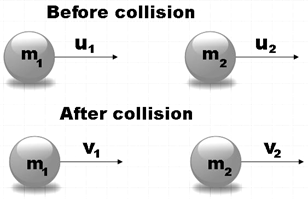Question
Question: Derive an expression for the velocity of the two masses \({{m}_{1}}\) and \({{m}_{2}}\) with speeds ...
Derive an expression for the velocity of the two masses m1 and m2 with speeds u1 and u2 undergoing elastic collision in one direction.
Solution
You could firstly recall the conservation of momentum and kinetic energy for the given case of elastic collision. Then by necessary rearrangements, you may find that the relative velocity of approach is equal to relative velocity of separation. Then by substituting accordingly in momentum conservation expression you will get the required answer.
Complete Step by step solution:
In the question, we are asked to find the expression for the velocity of two masses moving with different velocities after undergoing one dimensional elastic collision.
Let us consider two bodies with masses m1 and m2 moving with velocities u1 and u2 in one dimension.
These masses are undergoing collision and their velocities after collision become v1 and v2.

Momentum of the masses before collision is given by,
For m1, Momentum =m1u1
For m2, Momentum =m2u2
So, the total momentum of the system before collision will be,
P1=m1u1+m2u2
Kinetic energy of the masses before collision will be,
For m1,
K.E=21m1u12
For m2,
K.E=21m2u22
So, the total kinetic energy before collision could be given by,
K.E1=21m1u12+21m2u22
Momentum of the masses after collision is given by,
For m1, Momentum =m1v1
For m2, Momentum =m2v2
So, the total momentum of the system after collision will be,
P2=m1v1+m2v2
Kinetic energy of the masses after collision will be,
For m1,
K.E=21m1v12
For m2,
K.E=21m2v22
So, the total kinetic energy before collision could be given by,
K.E2=21m1v12+21m2v22
Now, we could use the law of conservation of momentum to get,
m1u1+m2u2=m1v1+m2v2
⇒m1(u1−v1)=m2(v2−u2) …………………………………. (1)
Then we could apply the law of conservation of kinetic energy to get,
21m1u12+21m2u22=21m1v12+21m2v22
⇒m1(u12−v12)=m2(v22−u22)……………………………………. (2)
Diving equation (2) by equation (1), we get,
m1(u1−v1)m1(u12−v12)=m2(v2−u2)m2(v22−u22)
⇒u1+v1=v2+u2
∴u1−u2=v2−v1 ………………………………………………………………. (A)
⇒v2=u1−u2+v1 …………………………………………….. (3)
⇒v1=v2−u1+u2 …………………………………………….. (4)
Substituting (3) in (1), we get,
m1(u1−v1)=m2((u1−u2+v1)−u2)
⇒m1u1−m1v1=m2u1−2m2u2+m2v1
∴v1=m1+m2m1−m2u1+m1+m22m2u2
Similarly, substituting (4) in (1), we get,
m1(u1−(v2−u1+u2))=m2(v2−u2)
⇒m1u1−m1v2−m1u1+m1u2=m2v2−m2u2
∴v2=m1+m22m1u1+m1+m2m2−m1u2
Therefore, we found the velocities of the masses m1 and m2 after collision respectively as:
**v1=m1+m2m1−m2u1+m1+m22m2u2
v2=m1+m22m1u1+m1+m2m2−m1u2 **
Note:
It is quite obvious that you may find this derivation cumbersome. So, we could actually remember certain points and thus shorten this derivation. You could keep in mind that relative velocity of approach is always equal to relative velocity of separation for an elastic collision, that is, the expression (A) in the solution. Now, you could do substitution accordingly in conservation of momentum and thus get the required relation.
